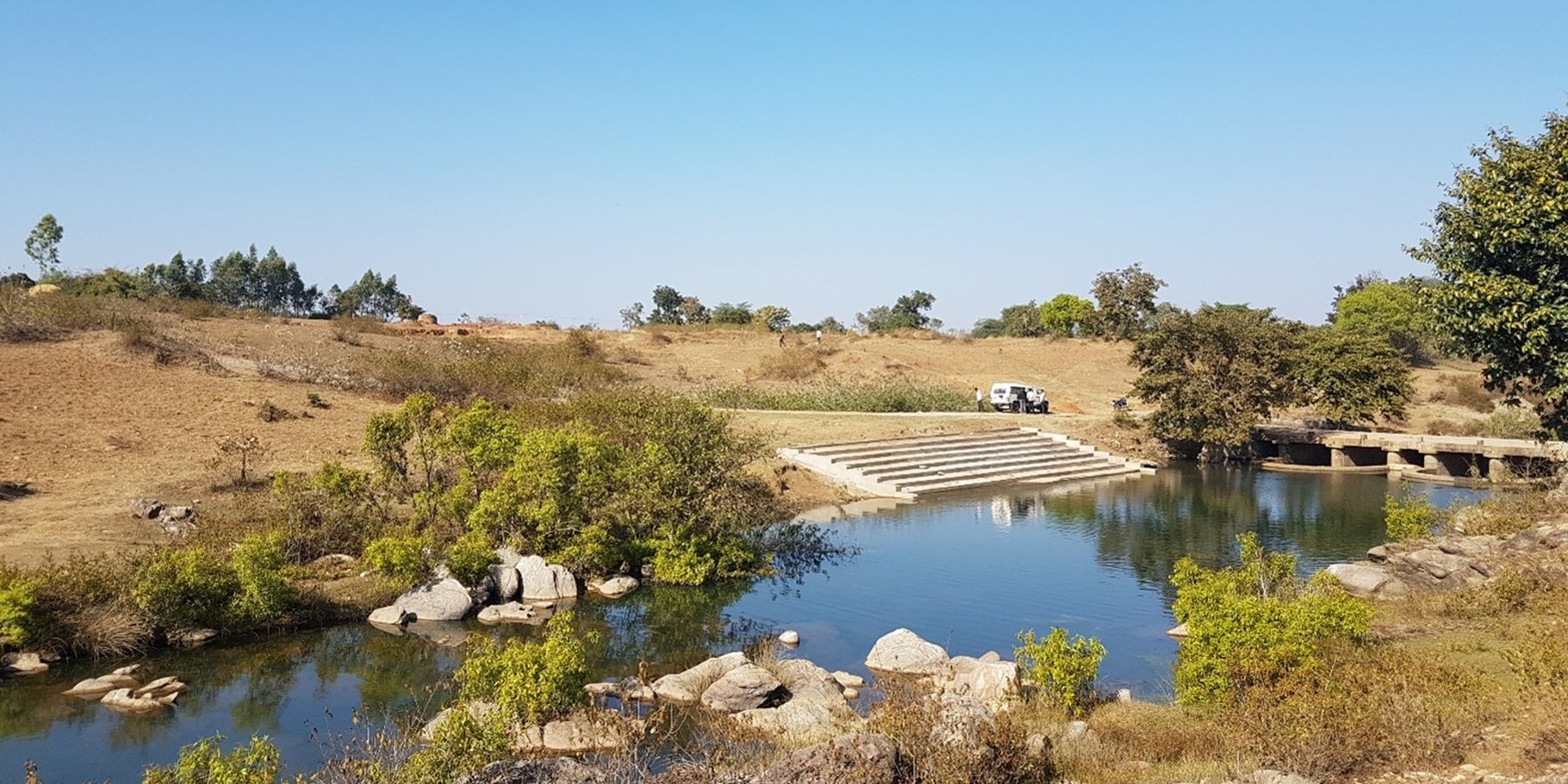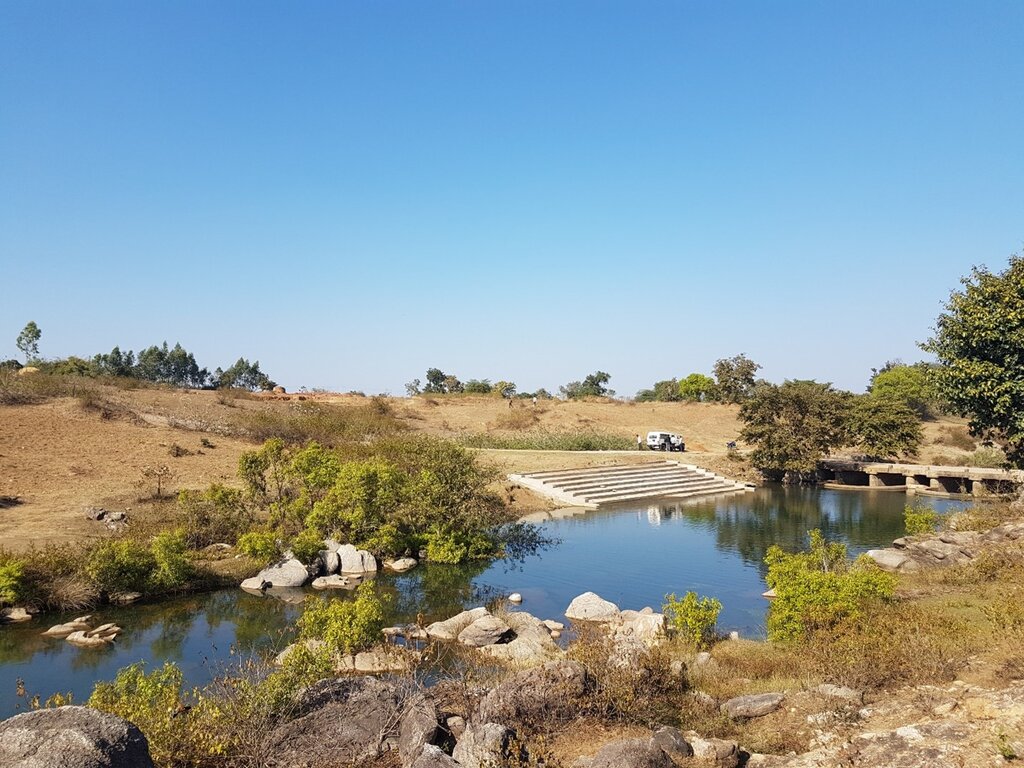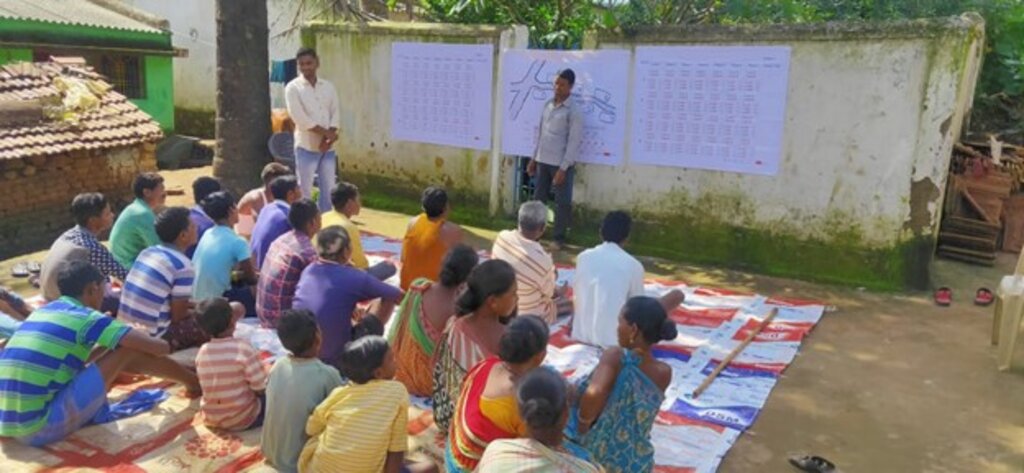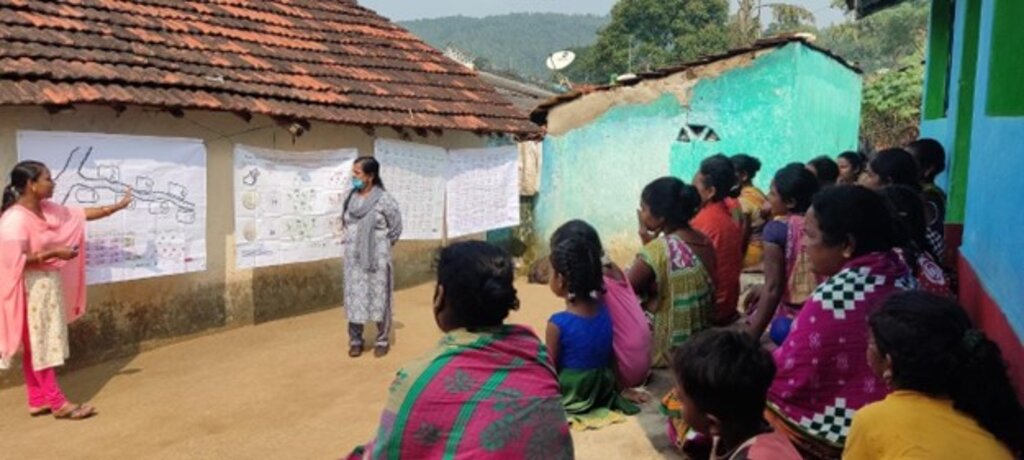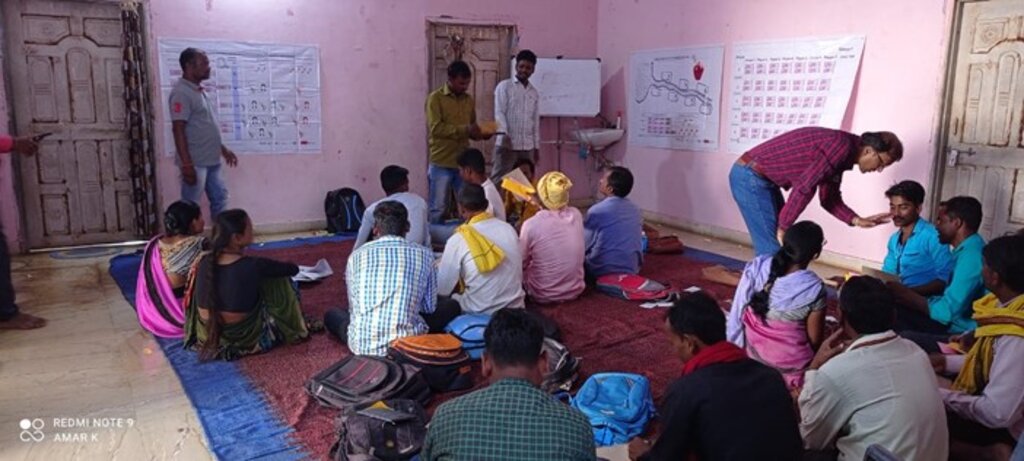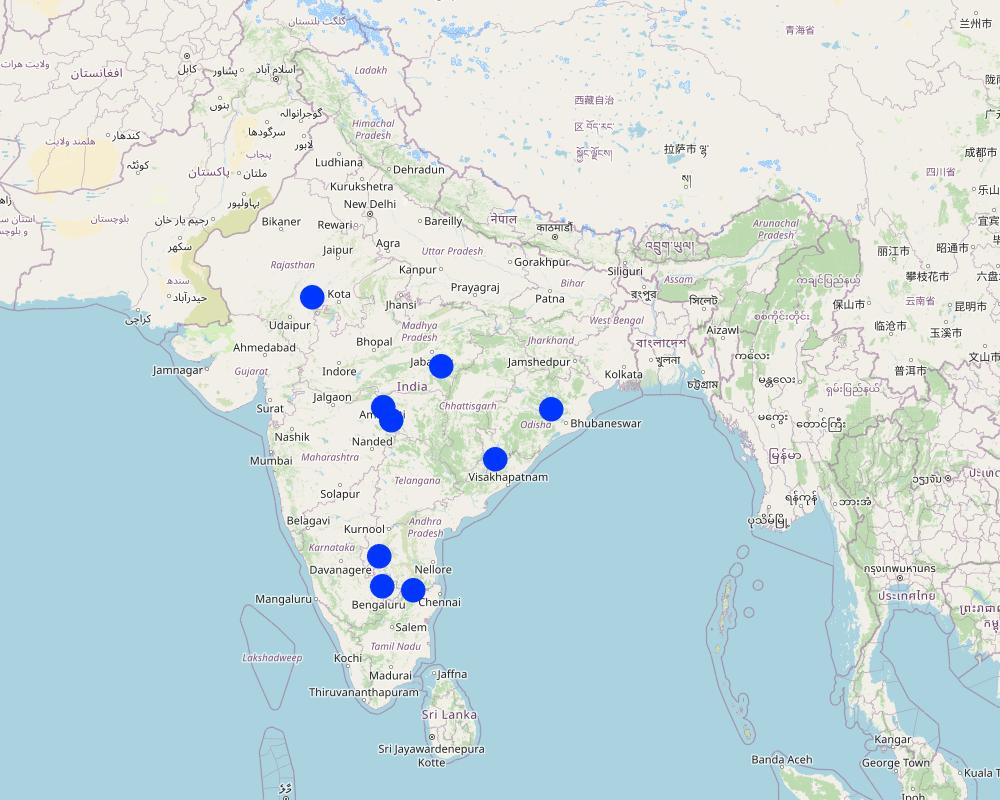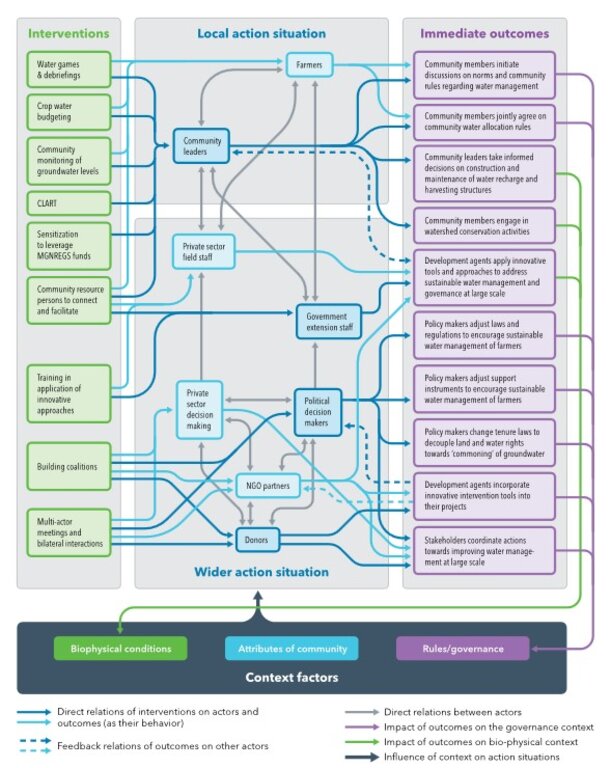Experiential Learning Tools for Sustainable Water Management [Энэтхэг]
- Шинийг нээх:
- Шинэчлэх:
- Эмхэтгэгч: Vishwambhar Duche
- Хянан тохиолдуулагч: –
- Хянагчид: Udo Höggel, Rima Mekdaschi Studer
Experiential Learning Tools
approaches_7289 - Энэтхэг
Бүлгүүдийг үзэх
Бүгдийг дэлгэх Бүгдийг хаах1. Ерөнхий мэдээлэл
1.2 Арга барилыг баримтжуулах болон үнэлгээ хийхэд оролцсон хүн эсвэл байгууллагын холбоо барих хаяг
ГТМ мэргэжилтэн:
ГТМ мэргэжилтэн:
хамтран эмхэтгэгч:
Sanil Richu
+91 8238065478 / +91 8129719386
richu@fes.org.in
Foundation for Ecological Security (FES)
Anand, Gujrat, India
Энэтхэг
хамтран эмхэтгэгч:
Duche Vishwambhar
хамтран эмхэтгэгч:
Hagar ElDidi
+1 202-862-5600
H.Eldidi@cgiar.org
International Food Policy Research Institute (IFPRI)
Washington, D.C., USA
Америк
хамтран эмхэтгэгч:
Wei Zhang
+1 202-862-5600
W.Zhang@cgiar.org
International Food Policy Research Institute (IFPRI),
Washington, D.C., USA
Америк
ГТМ мэргэжилтэн:
Melesse Mequanint
+254 715093444
Mequanint.Melesse@icrisat.org
International Crops Research Institute for the Semi-Arid Tropics (ICRISAT)
Nairobi, Kenya
Кени
Арга барилыг баримтжуулах/үнэлэх ажилд дэмжлэг үзүүлсэн төслийн нэр (шаардлагатай бол)
Experiential Learning Tools for Sustainable Water Management in India (funded by the German Federal Ministry for Economic Cooperation)Арга барилыг баримтжуулах/үнэлэх ажилд дэмжлэг үзүүлсэн төслийн нэр (шаардлагатай бол)
CGIAR support to the Promise of Commons Initiative in India (funded by Co-Impact Philanthropic Funds, Inc)Арга барилыг баримтжуулах/үнэлэх ажилд дэмжлэг үзүүлсэн төслийн нэр (шаардлагатай бол)
CGIAR Policy Innovations Science Program (PISP)Арга барилыг баримтжуулах/үнэлэх ажилд дэмжлэг үзүүлсэн байгууллага(ууд)-ын нэр (шаардлагатай бол)
International Food Policy Research Institute (IFPRI) - АмерикАрга барилыг баримтжуулах/үнэлэх ажилд дэмжлэг үзүүлсэн байгууллага(ууд)-ын нэр (шаардлагатай бол)
Foundation for Ecological Security (FES) - ЭнэтхэгАрга барилыг баримтжуулах/үнэлэх ажилд дэмжлэг үзүүлсэн байгууллага(ууд)-ын нэр (шаардлагатай бол)
International Crops Research Institute for the Semi-Arid Tropics (ICRISAT)1.3 WOCAT-аар баримтжуулсан өгөгдлийг ашиглахтай холбоотой нөхцөл
Мэдээллийг хэзээ (газар дээр нь) цуглуулсан бэ?
01/10/2021
Эмхэтгэгч болон гол мэдээлэгч хүн(хүмүүс) WOCAT аргачлалаар баримтжуулсан мэдээллийг ашиглахтай холбоотой нөхцлийг хүлээн зөвшөөрсөн:
Тийм
2. ГТМ Арга барилын тодорхойлолт
2.1 Арга барилын товч тодорхойлолт
The project “Scaling up experiential learning tools for sustainable water governance in India” aimed at enhancing sustainable water management at scale by improving the capacities of 1,500 rural communities covering 105,000 households directly and 2,000 communities covering 140,000 households indirectly in six Indian states to manage water more sustainably. This was achieved through experiential learning from collective action games, structured community debriefings, and participatory water planning tools that contribute to greater awareness and improved governance, inducing behavioural change toward more sustainable water governance and management.
The work was jointly conducted by the Foundation for Ecological Security, India (FES), the International Food Policy Research Institute (IFPRI) and the International Crops Research Institute for the Semi-Arid Tropics (ICRISAT).
2.2 Арга барилын дэлгэрэнгүй тодорхойлолт
Арга барилын дэлгэрэнгүй тодорхойлолт:
The project team adopted a holistic approach to water governance, considering the complex interconnections between water, land, livelihoods, people, and institutions. Rather than viewing groundwater in isolation, the team promoted the conjunctive use of surface and groundwater for irrigation, integrating both supply- and demand-side strategies to water management. Their approach included harnessing data, experiential learning, capacity building, participatory planning, and strategic communication to initiate behavioural change among actors at both community and broader levels.
At the community level, the team focused on shifting behaviour towards sustainable water use by farmers and local communities. They employ tools like the Groundwater Monitoring Tool (GWMT) for collective resource monitoring, experiential learning games and debriefing for social learning, and Crop Water Budgeting (CWB) for participatory water management, sensitization to leveraging funds of the Mahatma Gandhi National Rural Employment Guarantee Scheme (MGNREGS), scientific and participatory planning through the Composite Landscape Assessment and Restoration Tool (CLART). These tools aim at enhancing the understanding of water as a shared resource, at developing the capacity of community resource persons, at fostering collective decision-making, and at encouraging the adoption of water-efficient practices.
Aiming to influence higher-level actors, the project engaged in multi-actor platforms (MAPs) and built coalitions to promote collaborative water governance. These platforms facilitated discussions among various stakeholders, aiming to bridge governance gaps and encourage coordinated actions. The project also provided training to civil society, government, and private sector actors on water governance, equipping them with the knowledge and tools necessary to adopt sustainable practices.
Overall, the project aimed at creating a web of interconnected interventions that influence the behaviour of stakeholders across different levels, ultimately leading to improved water governance and sustainable resource management.
2.3 Арга барилын зурагууд
Гэрэл зурагтай холбоотой ерөнхий тэмдэглэл:
Experiential learning tools like the Surface Water Game, the Channel Irrigation Game, the Dam Maintenance Game, and the Groundwater Game played with the farmers who are enjoying benefits of water from common water resources or their private groundwater resources like borewell to irrigate their crops.
2.4 Арга барилын бичлэгүүд
Тайлбар, товч тодорхойлолт:
Surface Water Game:
Part: 1 This part of the video gives brief introduction, intention of the game, and explain concept of the game.
https://www.youtube.com/watch?v=fpEkeupt_YE
Part: 2 This part of the video explains about the required facilitation team, their roles, facilitation process, material required for the game, and selection of the participants for the game.
https://www.youtube.com/watch?v=SazPe5OHNis
Part-3 This part of the video explains the process of the game, how to take decision from the participants, how to enter players’ decisions into the app, and how to reveal results etc.
https://www.youtube.com/watch?v=aJbyVy4nlIk
Огноо:
22/03/2021
Байршил:
ICRISAT, Hyderabad, Telangana, India
Зураглаачийн нэр:
ICRISAT, and KUZA net
Тайлбар, товч тодорхойлолт:
Channel Irrigation Game:
Part-1: This part of the video gives brief introduction about the channel irrigation game, intention of the game, and explain concept of the game.
https://www.youtube.com/watch?v=Bw3rCoyKdF0
Part-2: This part of the video explains about the required facilitation team, their roles, facilitation process, material required for the game, and selection of the participants for the game.
https://www.youtube.com/watch?v=Y3aLys5oCBs
Part:3: This part of the video explains the process of the game, how to take decision from the participants, how to enter players’ decisions into the app, and how to reveal results etc.
https://www.youtube.com/watch?v=_-j07Wjily8
Огноо:
22/03/2021
Байршил:
ICRISAT, Hyderabad, Telangana, India
Зураглаачийн нэр:
ICRISAT, and KUZA net
Тайлбар, товч тодорхойлолт:
Dam Maintenance Game
Part-1: This gives brief introduction about the Dam Maintenance game, intention of the game, and explain concept of the game.
https://www.youtube.com/watch?v=C8S1XURT0nw
Part-2: This part of the video explains about the required facilitation team, their roles, facilitation process, material required for the game, and selection of the participants for the game.
https://www.youtube.com/watch?v=w58A6NDDFRY
Part-3: This part of the video explains the process of the game, how to take decision from the participants, how to enter players’ decisions into the app, and how to reveal results etc.
https://www.youtube.com/watch?v=-LIkHbs1Hyw
Groundwater Game
Part-1: This gives brief introduction about the Groundwater Game, and intention of the game, explain concept of the game.
https://www.youtube.com/watch?v=0MOohqWOeAg
Part-2: This part of the video explains about the required facilitation team, their roles, facilitation process, material required for the game, and selection of the participants for the game.
https://www.youtube.com/watch?v=OpCHch348Kg
Part-3: This part of the video explains the process of the game, how to take decision from the participants, how to enter players’ decisions into the app, and how to reveal results etc.
https://www.youtube.com/watch?v=28ETRZsGv10
Огноо:
22/03/2021
Байршил:
ICRISAT, Hyderabad, Telangana, India
Зураглаачийн нэр:
ICRISAT, and KUZA net
2.5 Арга барил нэвтрүүлсэн улс орон / бүс нутаг / байршил
Улс:
Энэтхэг
Улс/аймаг/сум:
Andhra Pradesh, Rajasthan, Karnataka, Odisha, Maharashtra, and Madhya Pradesh States of India
Байршлын дэлгэрэнгүй тодорхойлолт:
Chittoor and Anantpur District of Andhra Pradesh, Bhilwara district of Rajasthan, Mandala District of Madhya Pradesh, Anugul and Koraput district of Odisha, Chikbalapur district of Karnataka, Yavatmal and Amaravati District of Maharashtra
Map
×2.6 Арга барилыг эхлэх, дуусах огноо
Эхлэх жилийг тэмдэглэ:
2013
2.7 Арга барилын төрөл
- төсөл / хөтөлбөр дээр үндэслэсэн
2.8 Арга барилын үндсэн зорилго, зорилтууд
The approach shall support sustainable land management practices that reduce the proportion of land that is degraded. This contributes to improved food security and strengthens resilience and adaptive capacity of communities through improved water management and irrigation. The approach embeds the ambition to empower women and marginalized groups in their contributions to agriculture and society in general.
These impact ambitions shall be achieved through behavioural changes in three domains:
1. Water supply side provisioning actions (mainly investments in and maintenance of minor water harvesting structures, such as dams, tanks, or small check dams).
2. Institutional service provision actions (mainly participatory formulation and enforcement of local by-laws on water management).
3. Water appropriation actions (mainly the use of water efficient agricultural technologies, esp. the consideration of crop water requirement in crop choices).
The outcomes of the interventions are seen in the light of needs and capacities of marginalized groups, esp. women and youth. The behavioural changes shall be achieved by influencing the system understanding and norms using the systemic experiential learning approach outlined above.
2.9 Арга барилын хүрээнд хэрэгжсэн Технологи/Технологиудад дэмжсэн эсвэл саад учруулсан нөхцлүүд
нийгэм / соёл / шашны хэм хэмжээ, үнэт зүйлс
- Идэвхижүүлэх
1. Legal quota for women representation in local government bodies.
2. Inclusion of women farmers who are involved in selection of crops at household level and in decisions on the maintenance of common water infrastructures.
- Хазаарлалт
Depending on the state, social norms prevent women to freely speak in the presence of men.
Бүтэц зохион байгуулалт
- Идэвхижүүлэх
The Mahatma Gandhi National Rural Employment Guarantee Scheme (MGNREGS) can be leveraged to support sustainable water management.
- Хазаарлалт
1. Subsidies (especially on energy) and other support mechanisms discourage sustainable water management.
2. Changing rules about water use sometimes requires longer time for deliberation and policy making.
талуудыг хамтын ажиллагаа/зохицуулалт
- Идэвхижүүлэх
A cross-sectoral alliance called “The Promisse of Commons” creates a strong movement also with regards to sustainable water management.
- Хазаарлалт
Multiple stakeholders often act in their own silos.
Хууль, эрхзүйн хүрээ (газар эзэмшил, газар, ус ашиглах эрх)
- Идэвхижүүлэх
Recent revisions of Government support mechanisms such as minimal support prices also include water efficient crops.
- Хазаарлалт
Water rights are connected to land rights creating the widespread perception that water underneath ones land can be used without restrictions.
Бодлогууд
- Идэвхижүүлэх
1. Diverse Central Government and State level policies, guidelines and regulations support participatory and sustainable watershed management.
2. Policies that favour participatory management of water resources and focus on behaviour change such as Atal Bhujal Yojana.
3. Policies that support zoning of rice production based on water tables.
- Хазаарлалт
1. Policies that give price guarantees by way of a minimum support price for farmers for growing water intensive crops.
2. Energy subsidies encourage intensive groundwater pumping.
ГТМ-ийн талаарх мэдлэг, техникийн дэмжлэг авах боломж
- Идэвхижүүлэх
Watershed interventions have a long history in India and there is widespread knowledge about sustainable soil-water management practices
- Хазаарлалт
Most implementing organizations including the government focus on supply side water management interventions.
зах зээл (материал худалдан авах, бүтээгдэхүүн борлуулах), үнэ
- Идэвхижүүлэх
Supporting development of market opportunities for less-water consumptive crops and their products.
- Хазаарлалт
1. Consumer preferences favor water intensive commodities.
2. Rising salary level for farm labor
ажлын багтаамж, хүн хүчний нөөц бололцоо
- Идэвхижүүлэх
The Mahatma Gandhi National Rural Employment Guarantee Scheme (MGNREGS) also supports work of local communities on soil-water management.
- Хазаарлалт
Low labor requirements of flood-irrigated rice production make many farmers prefer this water-consumptive cropping system compared to more water-efficient production systems.
3. Оролцогч талуудын оролцоо ба үүргүүд
3.1 Арга барилд оролцогч талууд болон тэдгээрийн үүргүүд
- Орон нутгийн газар ашиглагч / орон нутгийн иргэд
Farmers who are using common or private water resources for cultivation of post rainy-season crops.
Building the capacity of water resource (Private or common) user.
- олон нийтэд түшиглэсэн байгууллагууд
1. Foundation for Ecological Security (FES)
2. Water User Associations
3. Farmers groups
4. Women self-help groups
5. Pasture land development committees
6. SLM specialists / agricultural advisors
7. Sanjeevani Institute for Empowerment and Development (SIED)
8. PRADAN
9. VIKSAT
10. Reliance Foundation
11. Swadesh Foundation
Building the capacity of water resource (Private or common) user
- ГТМ-ийн мэргэжилтэн/ хөдөө аж ахуйн зөвлөх
IFPRI (https://www.ifpri.org)
ICRISAT (https://www.icrisat.org)
FES (https://fes.org.in)
Technical support to the design of the approach
- Хувийн хэвшил
Cotton Connect (https://www.cottonconnect.org/)
Cotton Connect provide farmers with the training, education and tools they need to improve their productivity, income and profitability.
- Олон улсын байгууллага
1. International Food Policy Research Institute, IFPRI
2. International Crops Research Institute for the Semi-Arid Tropics, ICRISAT
Supporting with agricultural and food policy research
- Government Partners
1. Atal Bhujal Yojana National Program Management Unit (NPMU),
2. Odisha Agriculture Department & Odisha Livelihoods Mission
The goal of Atal Bhujal Yojana (Atal Jal) is to demonstrate community-led sustainable groundwater management which can be taken to scale. The major objective of the scheme is to improve the management of groundwater resources in selected water-stressed areas and states.
Odisha Livelihood Mission has put in place a dedicated and sensitive support structure, to take the rural poor households out of poverty line trough capacity building, financial assistance and self-reliant institutions.
Хэрэв хэд хэдэн оролцогч талууд оролцсон бол голлох төлөөлөгчийг зааж өгнө үү:
Foundation for Ecological Security (Pratiti Priyadarshini)
3.2 Арга барилын янз бүрийн үе шатанд орон нутгийн газар ашиглагчид / бүлэглэлүүдийг татан оролцуулах
| Орон нутгийн газар ашиглагч / орон нутгийн иргэдийн оролцоо | Хэн оролцсоныг тодорхойлж, үйл ажиллагааг тайлбарлана уу | |
|---|---|---|
| санаачлага/идэвхжүүлэлт | идэвхигүй | The Foundation for Ecological Security (FES) has local presence in the Districts targeted with direct interventions. The NGO expressed the need for advancing their toolbox through established and trustful relations to local communities, FES consulted communities regarding their main water management challenges. The results of these consultations formed the basis for the design of the intervention strategy and the development of the approach. Specific communities were selected based on their interest in improving water management and the severeness of water management challenges they face. Within the villages, especially households living close to water resources and enjoying benefit from the water resources and farmers who own private groundwater pumps were invited to participate in activities. |
| Төлөвлөгөө | идэвхигүй | The planning of the implementation of interventions was mainly done by the project partners, most importantly the Foundation for Ecological Security. FES trained local community members to become Community Resource Person (CRP). CRPs organize the implementation of specific interventions in interaction with community members. |
| Хэрэгжилт | өөрийн хүчийг нэгтгэсэн | Community members actively participated in experiential learning games, participatory crop water budgeting, the participatory planning of water infrastructure investments using CLART, focus group discussions, debriefings and bilateral interactions. |
| Мониторинг/ үнэлгээ | интерактив | After the interventions, CRPs work closely with the communities and, if needed, FES helps community members to formulate or revise water rules and by-laws. Community members monitor the water table of their wells. |
3.3 Диаграм (хэрэв боломжтой бол)
Тодорхойлолт:
Interconnections between actors and interventions
Зохиогч:
Sanil, Falk, Meinzen-Dick, Priyadarshini (2024)
3.4 ГТМ-ийн технологи/технологиуд сонгох шийдвэр
Хэрэгжүүлэх Технологи/Технологиудын сонголтыг хийж шийдвэр гаргасан хүнийг тодорхойлно уу:
- ГТМ-ийн мэргэжилтэн дангаараа
Тайлбар:
With the help of a set of questions, the decision tree for water governance games will advise CRPs and other facilitators in applying specific experiential learning tools fitting to the specific situation at site. The tool examines which challenges are present and identifies interventions to address those challenges. After checking whether water scarcity is an issue, CRPs ask local key informants such as community leaders, committee members or elders whether the community is primarily using surface water from channels or large dams. If the community is not connected to a channel or large dam irrigation system, they assess whether wells frequently run dry and need to be deepened, and whether groundwater is intensively used for irrigation. If this is the case, they check whether there are alternative management practices, like more water-efficient crop choices that could improve group outcomes. Finally, they ask whether there are already local rules dealing with this situation. Similar sequences of questions were used to ask about the collective maintenance of water harvesting structures, and allocation of surface water from structures such as small ponds or “tanks”. This process ends with a recommendation of which group of tools are best suited for the context, including which game would resonate best with community challenges (Channel irrigation game, Groundwater game, or Surface water game), and what related decision support tools the communities may benefit from, such as Crop-Water Budgeting (CWB) and the Composite Landscape Assessment and Restoration Tool (CLART).
- •Experience of CRPs and local key informants; Lessons and highlights emerging from diagnostic and consultation processes
4. Техникийн дэмжлэг, чадавхи бүрдүүлэх, мэдлэгийн менежмент
4.1 Чадавхи бэхжүүлэх/сургалт
Газар эзэмшигчид / бусад оролцогч талуудад сургалт явуулсан уу?
Тийм
Хэн сургалтанд хамрагдсан бэ:
- хээрийн ажилтан / зөвлөх
- Government officials, community members
Хэрэв шаардлагатай бол хүйс, нас, яс үндэс, гэх мэт. нэмнэ үү:
1. More than 500 government staff of Atal Bhujal Yojana Program.
2. More than 400 government extension workers of Odisha Livelihood Program.
3. More than 3000 additional government extension officers and field staff were trained in applying the experiential learning tools.
4. 1.086 local community members were trained in applying the experiential learning tools.
5. More than 52.000 community members participated in more than 5200 experiential learning sessions.
6. Senior Government officials were introduced to the approach in order to create their buy-in.
Сургалтын хэлбэр:
- фермерээс -фермер
- үзүүлэнгийн талбай
Хамрагдсан сэвдүүд:
1. Conceptual background of the approach
2. Demonstrations
3. Teaching the facilitation steps of the different tools
4. Exercising among the trainees and supervised implementation with community members.
5. Experiential learning games, crop water budgeting, CLART, and debriefings.
4.2 Зөвлөх үйлчилгээ
Газар ашиглагчдад зөвлөх үйлчилгээ авах боломжтой байдаг уу?
Тийм
- Private and civil society actors
Тодорхойлолт / тайлбар:
Government, private sector and civil society actors provide advisory services. The whole approach of the project is based on the idea of social learning where participants find own solutions based on gaining a better understanding of and activating social norms related to the hydrological system, the management challenge, associated social dilemmas, and possible solutions. This approach is very distinct from a typical one-directional advisory service.
4.3 Институцийг бэхжүүлэх (байгууллагын хөгжил)
Арга барилаар дамжуулан институц байгуулагдаж эсвэл бэхжсэн үү?
- Тийм, маш их
Байгууллагууд бэхжиж, үүсэн бий болсон түвшин(үүд)-г тодорхойлно уу:
- Орон нутгийн
- Бүс нутгийн
- Үндэсний
Байгууллага, үүрэг, хариуцлага, гишүүд гэх мэтийг тайлбарлах:
The approach has a clear intention to strengthen local water governance. In pilot studies, we found that communities who participated in experiential learning games were more likely to adopt water registries as a water planning method.
Дэмжлэгийн төрлийг ялга:
- чадавхи бэхжүүлэх / сургалт
4.4 Мониторинг ба үнэлгээ
Мониторинг болон үнэлгээ нь арга барилын хэсэг үү?
Үгүй
Тайлбар:
FES monitors progress of activities and outputs through contextualized key performance indicators and evaluated progress towards outcomes through reviews and workshops. In addition, the partners conducted a multi-method impact assessment including a rigorous quantitative comparison of 314 randomly selected treatment sites with 158 control sites with regards to effects on:
1. System understanding
2. Injunctive norms for sustainable water management
3. Women community members’ involvement in water-related decision-making
4. Investments in formulating water management rules as an institutional service provision
5. Enforcement of water management rules as an institutional service provision
6. Investments in water harvesting structures as a resource provisioning activity or leverage public funding's such as MGNREGS for the purpose
7. Conditions of water-related infrastructure
8. Crop choices with lower water consumption levels, resulting in irrigated water savings
4.5 Судалгаа
Судалгаа арга барилын хэсэг нь байсан уу?
Тийм
Сэдвийг тодруулна уу:
- Социологи
- Эдийн засаг/ зах зээл
- Экологи
Дэлгэрэнгүй мэдээллийг өгч, хэн судалгаа явуулсныг бичнэ үү:
In addition to the aforementioned impact assessment, we conducted research to conceptualize behavioural change mechanisms associated with experiential learning. We also synthesized lessons learned with regards to design features of tools, assessed effects of women’s participation, and developed a theory of system-level change to guide implementations and inform future programs in the area.
5. Санхүүгийн болон гадаад материаллаг дэмжлэг
5.1 ГТМ-ийн Арга барилын бүрэлдэхүүн хэсгийн жилийн төсөв
Хэрэв жилийн төсөв тодорхойгүй бол хягаарыг тодруулна уу:
- < 2,000
Тайлбар (жнь: санхүүжилтийн гол эх үүсвэр / гол хандивлагчид):
The described approach has been implemented in multiple stages with different funding sources. Training 1.086 local community members in applying the experiential learning tools and conducting experiential learning sessions with 12.000 community members participated in more than 1.200 experiential learning sessions was implemented with a budget of 1.2 Mio Euro.
According to our estimates, conducting one experiential learning session at one site costs between 70 and 120 USD depending on accessibility and the need for facilitation of other stakeholders. This includes the time of facilitators, transport, materials and initial training.
5.2 Газар ашиглагчдад санхүүгийн / материаллаг дэмжлэг үзүүлсэн
Технологи / технологийг хэрэгжүүлэхэд газар ашиглагчид санхүүгийн / материаллаг дэмжлэг авсан уу?
Үгүй
5.3 Тодорхой зардлыг даахад чиглэсэн дэмжлэгт (хөдөлмөрийн хүчийг оролцуулаад)
- үгүй
5.4 Кредит
Арга барилын хүрээнд ГТМ-ийн үйл ажиллагаанд зориулж зээлд хамрагдсан уу?
Үгүй
5.5 Бусад урамшуулал, хэрэгсэл
ГТМ-ийн технологийг хэрэгжилтийг дэмжихэд ашигласан бусад урамшуулал, хэрэгсэл байсан уу?
Үгүй
6. Нөлөөллийн дүн шинжилгээ ба дүгнэлт
6.1 Арга барилын нөлөөллүүд
Арга барил нь орон нутгийн газар ашиглагчдыг чадваржуулах, оролцогч талуудын оролцоог сайжруулсан уу?
- Үгүй
- Тийм, бага зэрэг
- Тийм, зарим
- Тийм, их
Community members voluntarily participated in the experiential learning sessions. It brought together different stakeholders at the village level and initiated discussion around water management.
Арга барил нь ГТМ-ийн технологийг хэрэгжүүлж, хадгалахад газар ашиглагчдад тусласан уу?
- Үгүй
- Тийм, бага зэрэг
- Тийм, зарим
- Тийм, их
In a study in Madhya Pradesh in 2018, we found evidence that two years after the intervention, key informants of communities who participated in experiential learning sessions reported with an approximately 20 percent higher probability that maintenance activities of common local water harvesting structures had taken place. An impact assessment, comparing 314 randomly selected treatment sites with 158 control sites confirmed that participants in interventions made stronger efforts to maintain local water harvesting structures and, if cultivating crops in the post-rainy season, reduce the size of the cultivated area.
Арга барил нь ГТМ-ийн зардал хэмнэсэн хэрэгжилт, зохицуулалтыг сайжруулсан уу?
- Үгүй
- Тийм, бага зэрэг
- Тийм, зарим
- Тийм, их
The approach brought together different stakeholders from the village to the central government level and initiated discussion around water management.
Арга барил нь ГТМ хэрэгжүүлэхэд газар ашиглагчдын мэдлэг, чадварыг сайжруулахад хүргэсэн үү?
- Үгүй
- Тийм, бага зэрэг
- Тийм, зарим
- Тийм, их
More than 52.000 community members participated in more than 5200 experiential learning sessions. The participatory crop-water budgeting and common water infrastructure planning exercises provided communities with additional information towards better informed decisions. In an impact assessment, comparing 314 randomly selected treatment sites with 158 control sites we did not find that water related system-understanding improved in the dimensions assessed. Given that we observed behavioural changes and a high level of system understanding during the baseline assessment, we hypothesize that knowledge was either not the constraining factor or that our assessment did not capture the most relevant knowledge dimensions being affected by the intervention.
Арга барил нь эмзэг бүлгийнхнийг нийгэм, эдийн засгийн хувьд чадавхижуулсан уу?
- Үгүй
- Тийм, бага зэрэг
- Тийм, зарим
- Тийм, их
•We have implemented the experiential learning tools in areas having small and marginal farmers and marginalized communities, such as Scheduled Casts and Scheduled Tribes. •An impact assessment, comparing 314 randomly selected treatment sites with 158 control sites found that women reported, after participating in experiential learning sessions, a greater likelihood of their participation in agricultural decision processes.
Арга барил нь жендэрийн тэгш байдлыг сайжруулж, эмэгтэйчүүд, охидыг чадавхжуулсан уу?
- Үгүй
- Тийм, бага зэрэг
- Тийм, зарим
- Тийм, их
An impact assessment, comparing 314 randomly selected treatment sites with 158 control sites found that women reported, after participating in experiential learning sessions, a greater likelihood of their participation in agricultural decision processes.
Арга барил нь чанаржуулсан шим тэжээл/ хүнсний аюулгүй байдалд хүргэсэн үү?
- Үгүй
- Тийм, бага зэрэг
- Тийм, зарим
- Тийм, их
We have no related evidence but assume that improved maintenance of common water infrastructure improved post-rainy season water supply including for irrigation and food production. The approach intended to trigger a shift of farmers to more water efficient crops. In our impact assessment, we do not find a significant change towards water efficient crops. Given that in our project region, water is the main constraining production factor, a shift towards water efficient crops would simultaneously improve sustainable water management and food production. We find, however, that farmers who participated in the interventions reduced the cultivated area in the post-rainy season. While this contributes to more sustainable water management and long-term food production, it may create unintended trade-offs with short-term food production. The partners continue refining the approach to address this effect.
Арга барил нь газар ашиглагчид уур амьсгалын өөрчлөлтөд дасан зохицох чадварыг дээшлүүлж, уур амьсгалын өөрчлөлттэй холбоотой гамшгийг бууруулах чадавхийг сайжруулсан уу?
- Үгүй
- Тийм, бага зэрэг
- Тийм, зарим
- Тийм, их
Sustainable water management including water harvesting strongly contributes to communities’ capacities to cope with climate change which increases the frequency of extreme events such as high rainfall events, droughts, and dry spells.
6.2 ГТМ-ийг хэрэгжүүлэх газар ашиглагчидын гол санаачилга
6.3 Арга барилын үйл ажиллагааны тогтвортой байдал
Газар ашиглагчид арга барилаар дамжуулан хэрэгжүүлсэн арга хэмжээг тогтвортой хадгалж чадах уу (гадны дэмжлэггүйгээр)?
- Тийм
Хэрэв тийм бол яаж гэдгийг тайлбарлана уу:
The actual SLM activities (especially maintaining water harvesting structures and growing water-efficient crops) are not done by the project but the community members themselves. The presented approach creates the space for communities to find their own solutions to water management challenges. Such solutions are with a higher likelihood tailored to the local context. The partners further assume that communities develop a strong sense of ownership to their solutions which creates motivation to implement them. Rules formulated by the communities may require less external enforcement as they are followed based on intrinsic motivations. The partners acknowledge possible constraints in terms of labour and materials. For this reason, the Foundation for Ecological Security supports communities to effectively leverage government funds. Most notable is the Mahatma Gandhi National Rural Employment Guarantee Scheme (MGNREGS) as a permanent large-scale government program with dual focus on improving rural livelihoods through creation of durable assets and strengthening local governance. MGNREGS allows communities to demand financial support for investments in construction and maintenance of natural resource management assets on public and individual lands.
6.4 Арга барилын тогтвортой/давуу тал/боломжууд
| Газар ашиглагчдын тодорхойлсон давуу тал/боломжууд |
|---|
| Please see Section 6.2. In general, the approach helps community members to initiate discussion on water issues. The games help in reinforcing the idea of water as a common good. Most elements of the toolbox bring together different stakeholders from the village to the district level and facilitate collective social learning. The debriefing sessions also allow discussion, deliberation, and relating game outcomes and learnings to their real-life challenges and solutions. The crop water budgeting helps in planning which crops to grow collectively after assessing the water situation. It offers space for all community members to deliberate on crop choice and consider various aspects before deciding on certain crops. |
| Эмхэтгэгч, бусад мэдээлэл өгсөн хүмүүсийн өнцгөөс тодорхойлсон давуу тал/боломжууд |
|---|
| There is growing recognition of the potential of experiential learning, which by definition includes experiencing, reflecting, and experimenting to support communities in finding own solutions. The approach contrasts with more formal presentations of abstract knowledge that are common in many forms of teaching, or costly learning by doing in real-life. For instance, games create a relatively low-risk forum for experiencing and discussing the complexities of social-ecological systems and allow for exploring behaviour that is too risky in real-life. This can lead directly into inventing and negotiating own rules, including enforcement mechanisms. Players can experiment with rule making and can take this experience into the interaction with the wider community. As the exercise can trigger constructive interaction of resource users and other stakeholders, the resulting social learning effect can potentially go beyond the specific issue or framing of the game to supporting the development of institutional capacity for sustainable commons management. As experiential learning supports participants in finding own solutions, these solutions are likely to be better adapted to the specific social-ecological systems and, therefore more accepted. This increases the likelihood of behavioural change. |
| The main advantage of the approach is its clear structure which makes it relatively easy to learn and replicate it at large scale. The cooperation with government partners confirms the strong demand for replicable and scalable behavioural change tools in the context of water management. |
6.5 Арга барилын дутагдалтай/сул тал/аюул болон тэдгээрийн хэрхэн даван туулах арга замууд
| Газар ашиглагч нарын тодорхойлсон сул тал/ дутагдал/ эрсдэл | Тэдгээрийг хэрхэн даван туулах вэ? |
|---|---|
| Community members need to mobilize own resources and may feel overtrained in implementing own solutions. | Local level partners and government can assist in supporting communities in the process of implementing solutions. Linking communities to permanent support structures such as the Mahatma Gandhi National Rural Employment Guarantee Scheme (MGNREGS) may be essential. |
| Improving sustainable water use can create short-term trade-offs with food production. | The approach intends to support solutions which do not create long-term trade-offs with food production. Facilitators can create awareness for such trade-offs. Learning tools can make such trade-offs more explicit and identifyable. |
| Swelling but hidden conflicts related to resource distribution and free-riding behaviour may break open. | It is important to note that the approach would not create conflict but only make conflicts visible. The games allow to discuss behaviour which is the source of conflict in a setting where it can be played in a symbolic way without pointing at any specific person. Firmly embedded community organisations such as the panchayat having a mandate to coordinate community issues is essential. Facilitators should be sensitized for signs of open conflicts and act sensitively. If necessary, they can support finding an adequate moderator. |
| Эмхэтгэгч, бусад мэдээлэл өгсөн хүмүүсийн өнцгөөс тодорхойлсон сул тал/ дутагдал/ эрсдэл | Тэдгээрийг хэрхэн даван туулах вэ? |
|---|---|
| Facilitators use inappropriate tools leading to inappropriate solutions. | Decision support tools were developed to guide facilitators appropriately. Taking the approach to new geographies requires a good idea of the management challenges. There may be need to adapt tools to new contexts. |
| Facilitators are impatient and fall back into a teaching mode. | Emphasizing the value of experiential learning and creating trust in the creative potential of communities needs to be a priority in facilitator trainings. |
| Communities think only within the space of existing knowledge | The approach can be combined with the sharing information on innovative technologies. |
| Policy and market dynamics override local level initiatives | Local level experiential learning needs to be embedded into a system level multi-stakeholder process. For instance, in our case, government officials needed to be aware of the problematic incentives created by energy subsidies, current minimal support price mechanisms and other farmer support systems. Building coalitions, multi-actor platforms and bilateral interactions need to part of the intervention strategy. |
| Unintended gender dynamics may appear | Great care needs to be taken on decisions such as whether to conduct mixed-sex sessions or sessions with women only. A good understanding and consideration of specific dynamics is essential. |
| A once-off intervention may be too weak to create a lasting effect. | If this is observed, the experiential learning interventions should be repeated. Important is to apply the combination of tools not only because they build on each other but also to sustained interaction with the community. |
| In the presence of elite groups, members of marginalized groups will not interact | The facilitator can navigate the discussion so that all groups are adequately represented. The facilitators are to be trained so to be more sensitive in the facilitation. If this is insufficient to ensure equal participation, conducting separate sessions with marginalised groups may be required, at least as a preparatory step. |
7. Суурь мэдээлэл болон холбоосууд
7.1 Мэдээллийн эх үүсвэр/аргууд
7.2 Холбогдох бүтээлийн ишлэл
Гарчиг, зохиогч, он, ISBN:
Meinzen-Dick, R., Chaturvedi, R., Domènech, L., Ghate, R., Janssen, M. A., Rollins, N. D., & Sandeep, K. (2016). Games for groundwater governance: Field experiments in Andhra Pradesh, India. Ecology and Society, 21(3).
Хаанаас авч болох вэ? Зардал?
India. Ecology and Society
Гарчиг, зохиогч, он, ISBN:
Meinzen-Dick, R., Janssen, M. A., Kandikuppa, S., Chaturvedi, R., Rao, K., & Theis, S. (2018). Playing games to save water: Collective action games for groundwater management in Andhra Pradesh, India. World Development, 107, 40-53.
Хаанаас авч болох вэ? Зардал?
World Development
Гарчиг, зохиогч, он, ISBN:
Falk, T., Kumar, S., & Srigiri, S. (2019). Experimental games for developing institutional capacity to manage common water infrastructure in India. Agricultural Water Management, 221, 260-269.
Хаанаас авч болох вэ? Зардал?
Agricultural Water Management
Гарчиг, зохиогч, он, ISBN:
Falk, T., V. Duche, Suhas K.S., I. Agrawal, and L. Bartels. 2020. The Role of Community Institutions in the Management of Water Infrastructure in the Context of Madhya Pradesh, India. J. Indian Water Resourc. Soc. 40 (3&4): 36-46
Хаанаас авч болох вэ? Зардал?
Journal of Indian Water Resource Society
Гарчиг, зохиогч, он, ISBN:
Falk, T., Zhang, W., Meinzen-Dick, R., & Bartels, L. (2021). Using Games to Trigger Collective Changes in Natural Resource Management: Conceptual Foundations for Behavioral Change. IFPRI Discussion Paper 02233. Washington DC/USA
Хаанаас авч болох вэ? Зардал?
IFPRI Discussion Paper
Гарчиг, зохиогч, он, ISBN:
Falk, T., Schüpf, D., Zhang, W., Soliev, I. (2021). A behavioral perspective on improving water governance in India. IFPRI blog
Хаанаас авч болох вэ? Зардал?
https://www.ifpri.org/blog/behavioral-perspective-improving-water-governance-india
Гарчиг, зохиогч, он, ISBN:
Falk, T., Schüpf, D., Zhang, W., Soliev, I. (2021) Understanding behavioral change for improved water governance: Reflecting on ongoing development interventions in India. Blog published at the European website of the International Association for the Study of the Commons
Хаанаас авч болох вэ? Зардал?
https://europe.iasc-commons.org/behavioral-change-improved-water-governance-india/
Гарчиг, зохиогч, он, ISBN:
Foundation for Ecological Security, International Crops Research Institute for the Semi-Arid Tropics, and International Food Policy Research Institute. 2021. Commoning the Commons: A Sourcebook to Strengthen Management and Governance of Water as Commons
Хаанаас авч болох вэ? Зардал?
https://fes.org.in/resources/sourcebooks,manuals,atlases-&-ecoprofiles/sourcebooks/strengthening_governance_and_management_of_water_as_commons_May_2022.pdf
Гарчиг, зохиогч, он, ISBN:
Bartels, L., Falk, T., Duche, V., & Vollan, B. (2022). Experimental games in transdisciplinary research: The potential importance of individual payments. Journal of Environmental Economics and Management, 113, 102631.
Хаанаас авч болох вэ? Зардал?
Journal of Environmental Economics and Management
Гарчиг, зохиогч, он, ISBN:
Falk, T., Zhang, W., Meinzen-Dick, R. S., & Bartels, L., Sanil, R., Priyadarshini, P. (2023) Games for Social Learning: Triggering Collective Changes in Commons Management. Ecology and Society.
Хаанаас авч болох вэ? Зардал?
Ecology and Society
Гарчиг, зохиогч, он, ISBN:
Janssen, M. A., Falk, T., Meinzen-Dick, R., & Vollan, B. (2023). Using games for social learning to promote self-governance. Current Opinion in Environmental Sustainability, 62, 101289.
Хаанаас авч болох вэ? Зардал?
Current Opinion in Environmental Sustainability
Гарчиг, зохиогч, он, ISBN:
Falk, T., Zhang, W., Meinzen-Dick, R., Sanil, R., Priyadarshini, P. (2023) Changing the game: Experiential learning for triggering large scale change towards sustainable water management in India. IFPRI blog.
Хаанаас авч болох вэ? Зардал?
https://www.ifpri.org/blog/changing-game-experiential-learning-triggering-large-scale-change-towards-sustainable-water
Гарчиг, зохиогч, он, ISBN:
Meinzen-Dick, R., & Bruns, B. (2024). Crafting Combinations to Govern Groundwater: Knowledge, Motivation, and Agency. International Journal of the Commons, 18(1).
Хаанаас авч болох вэ? Зардал?
International Journal of the Commons
Гарчиг, зохиогч, он, ISBN:
Sanil, R., Falk, T., Meinzen-Dick, R., & Priyadarshini, P. (2024). Combining Approaches for Systemic Behaviour Change in Groundwater Governance. International Journal of the Commons, 18(1), 411-424.
Хаанаас авч болох вэ? Зардал?
International Journal of the Commons
Гарчиг, зохиогч, он, ISBN:
ElDidi, H., Rawat, S., Meinzen-Dick, R., Chaturvedi, R., & Sanil, R. (2024). Polycentric governance of commons through multi-stakeholder platforms: insights from two case studies in India. Environment, Development and Sustainability, 1-27.
Хаанаас авч болох вэ? Зардал?
Environment, Development and Sustainability
Гарчиг, зохиогч, он, ISBN:
Falk, T., Duche, V., Sanil, R., Priyadarshini, P., ElDidi, H., Meinzen-Dick, R., Bruns, B. (2024) Playing the right game: A decision tree for choosing approaches to strengthen water governance. IFPRI blog
Хаанаас авч болох вэ? Зардал?
https://www.ifpri.org/blog/playing-right-game-decision-tree-choosing-approaches-strengthen-water-governance
7.3 Холбогдох мэдээллийн интернет дэх нээлттэй холбоосууд
Гарчиг/ тодорхойлолт:
Scaling up experiential learning tools for sustainable water governance in India
URL:
https://www.ifpri.org/project/scaling-experiential-learning-tools-sustainable-water-governance-india
Гарчиг/ тодорхойлолт:
Sourcebook
URL:
https://fes.org.in/resources/sourcebooks,manuals,atlases-&-ecoprofiles/sourcebooks/strengthening_governance_and_management_of_water_as_commons_May_2022.pdf
Гарчиг/ тодорхойлолт:
Crop Water Budgeting (CWB)
URL:
https://www.indiaobservatory.org.in/tool/cwb
Гарчиг/ тодорхойлолт:
Groundwater Monitoring Tool (GWMT)
URL:
https://wmt.indiaobservatory.org.in/dashboard/map-dashboard
Гарчиг/ тодорхойлолт:
Composite Landscape Assessment and Restoration Tool (CLART)
URL:
https://www.indiaobservatory.org.in/tool/clart-det
Гарчиг/ тодорхойлолт:
Surface Water Game Manual
URL:
https://gamesforsustainability.org/practitioners/#surface-water-game
Гарчиг/ тодорхойлолт:
Channel Irrigation Game
URL:
https://gamesforsustainability.org/practitioners/#chanel-irrigation-game
Гарчиг/ тодорхойлолт:
Dam Maintenance Game
URL:
https://gamesforsustainability.org/practitioners/#game-on-managing-check-dams
Гарчиг/ тодорхойлолт:
Groundwater Game
URL:
https://gamesforsustainability.org/practitioners/#groundwater-game
Холбоос ба модулууд
Бүгдийг дэлгэх Бүгдийг хаахХолбоосууд
Холбоос байхгүй байна
Модулууд
Модуль байхгүй байна


